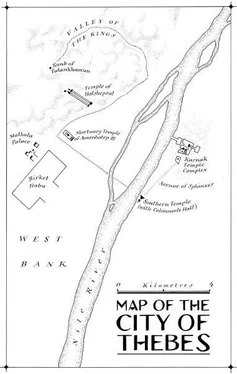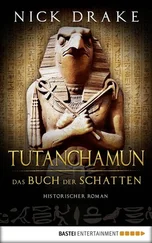Nick Drake - Tutankhamun - The Book of Shadows
Здесь есть возможность читать онлайн «Nick Drake - Tutankhamun - The Book of Shadows» весь текст электронной книги совершенно бесплатно (целиком полную версию без сокращений). В некоторых случаях можно слушать аудио, скачать через торрент в формате fb2 и присутствует краткое содержание. Жанр: Исторический детектив, на английском языке. Описание произведения, (предисловие) а так же отзывы посетителей доступны на портале библиотеки ЛибКат.
- Название:Tutankhamun: The Book of Shadows
- Автор:
- Жанр:
- Год:неизвестен
- ISBN:нет данных
- Рейтинг книги:4 / 5. Голосов: 1
-
Избранное:Добавить в избранное
- Отзывы:
-
Ваша оценка:
- 80
- 1
- 2
- 3
- 4
- 5
Tutankhamun: The Book of Shadows: краткое содержание, описание и аннотация
Предлагаем к чтению аннотацию, описание, краткое содержание или предисловие (зависит от того, что написал сам автор книги «Tutankhamun: The Book of Shadows»). Если вы не нашли необходимую информацию о книге — напишите в комментариях, мы постараемся отыскать её.
Tutankhamun: The Book of Shadows — читать онлайн бесплатно полную книгу (весь текст) целиком
Ниже представлен текст книги, разбитый по страницам. Система сохранения места последней прочитанной страницы, позволяет с удобством читать онлайн бесплатно книгу «Tutankhamun: The Book of Shadows», без необходимости каждый раз заново искать на чём Вы остановились. Поставьте закладку, и сможете в любой момент перейти на страницу, на которой закончили чтение.
Интервал:
Закладка:
On a quiet signal from Simut, the guards fanned out around the King, organized as dancers, their arms and bows presented, as he stepped down on to the hot stones of the city. Simut and I scanned the crowds and the rooftops for any signs of trouble. Horemheb waited for the right moment; then he respectfully offered the throne to the King. But his every arrogant gesture made the King seem the less powerful man. Something about the cold expression on Horemheb’s face even seemed to keep the flies away. He turned to the silent arena. An obedient silence fell. He shouted to every one of the thousands of men present.
‘I speak to his majesty, Tutankhamun, Lord of the Two Lands. I bring chiefs of every foreign territory to beg life from him. These vile foreigners who do not know the Two Lands, I lay them beneath his feet for ever and eternally. From the furthest reaches of Nubia to the most distant regions of Asia, all are under the command of his great hand.’
Then Horemheb carefully set his knee to the ground, bowed his sleek head with arrogant humility, and waited for the King to acknowledge his formulaic words. The moments dripped by like the water in a clock, as Tutankhamun left him to stoop in public deference for as long as possible. I was impressed. The King was taking command of the occasion. The crowd remained hushed, alert to this consummate confrontation played out in the language of appearance and protocol. Finally, judging the moment precisely, the King laid a gift of five magnificent gold collars around the general’s neck. But he managed to make them look like a burden of responsibility, as much as a gift of respect. Then he raised the general, and embraced him.
The King moved forward, to accept the greetings and obeisance of the other officials as necessary. Finally he ascended the throne on the dais, under the canopy that gave some relief from the burning heat of the sun on the stones. At a command from Horemheb, every division and every group of war prisoners was then paraded before him, accompanied by trumpets and drums. It took hours. But the King maintained his rigid posture, and his distant gaze, even though the sweat was running from under the crowns, and dampening his tunic.
We travelled by chariot into the central city. Simut and I went first, ahead of Tutankhamun, who was flanked by his running guards, their weapons flashing in the high sunlight. I noticed the buildings and headquarters here were like those in Thebes, if far greater in number: the town houses were built upwards for lack of space, and down side passages were the humbler dwellings of those who laboured in the services of the army, the central institution of this city; single rooms which were workroom, stable and home in one, opened directly on to the messy streets. The royal roads and the paved surfaces of the sacred ways, which were lined with sphinxes, obelisks and chapels, were kept clear of onlookers, and so we travelled quickly towards the Palace of Memphis. Over the harsh noise of the wheels on the rutted paving stones, Simut pointed out the famous sights: to the north, the vast old mud-brick construction of the old Citadel, the White Walls, which gave their name to the district, and the Great Temple of Ptah to the south, with its own great enclosure wall. A temple canal ran south all the way to the outlying temple district of the Goddess Hathor. Other canals flashed into view as we passed, linking the river and the port to the central city.
‘There are at least forty-five different cults in the city, and each has its own temple,’ he shouted, proudly. ‘And out to the west is the Temple of Anubis.’ I imagined the embalmers, the coffin-makers, the makers of masks and amulets, and the writers of the Books of the Dead, all the specialized craftsmen who clustered into such a quarter to conduct the complex business of that powerful God, Guardian of the Necropolis and of the Tombs against evildoers. But there would be no time for tours of curiosity.
Simut was eager we should arrive ahead of the King; huge crowds had already gathered in the tight spaces of the passageways and streets, to catch a glimpse of his arrival at the great Palace of Memphis, but they were not allowed near the open area in front of the palace gate towers. Nevertheless this was a security nightmare, for it was packed with foreign and local dignitaries and officials and elite men. Simut’s advance guard were swiftly ready; silently and efficiently taking up positions and peremptorily ordering people out of the way to create a path of safety and security for the King. They knew exactly what they were doing, and moved as one in patterns they must have practised and performed many times before. Their brusquely immaculate behaviour left no one, even the Memphis palace guards themselves, in doubt of their authority. Royal archers followed, their great bows drawn and aimed up at the rooftops.
Then the temple trumpets sounded from the walls as the King arrived, surrounded by more guards. Their tribute, the clamour of the crowds, the bellowed orders of the commanders, were deafening; but suddenly the royal cavalcade passed from the dusty heat and light and cacophony of the streets into the cool silence of the first reception hall. At once we were all gathered in relative security. Here, yet more high officials awaited the King’s arrival. This was the first time I had seen him closely in a more social situation. Whereas in the palace he had sometimes seemed like a lost boy, now he held himself like a king: his posture upright and dignified, his elegant face calm and composed, his expression seeking no approval in anxious smiles, nor expressing his power in haughty arrogance. He had a charisma that came from his unusual looks, his youth, and his other quality that I remembered from when he was a boy: that of an old soul in a young man’s body. Even the gold walking stick which he carried everywhere became an enhancement of his personality.
Simut had warned me there had been a great deal of political pressure from General Horemheb’s office for the King to be accommodated overnight in the palace on this royal visit. But Ay’s office had insisted the King attend the necessary functions, and then return to the ship for a late departure. It was the right decision. Memphis was dangerous. The city was the heart of the administration of the Two Lands, but it was also the location of the army’s headquarters and barracks; unfortunately the loyalty of the army could not be entirely trusted at this delicate time, especially under Horemheb.
The great chamber echoed with the noise of hundreds of elite men-diplomats, foreign officials, wealthy businessmen, high-ranking officers-bragging, barking and yapping self-importantly at each other as they manoeuvred among the crowds, each working hard to stand near, or speak to and impress, their superiors, or to denigrate their equals and lessers. I moved through the noisy crowds, and kept near to the King. I saw how he nodded as each person in turn was introduced by his two officers, and then dealt with each petitioner and dignitary, managing the brief moments of the interview, responding elegantly to praises and offerings, and giving a sense to each man that he was important, and would be remembered.
Then I suddenly noticed Horemheb standing in the shadow cast by one of the columns. He was being addressed, and evidently bored witless, by some fatuous official, but his eyes were focused, with the poised attention of a leopard, on the King. For a moment he looked like a hunter with his prey. But then the King caught his glance, and Horemheb smiled quickly. Then he moved forward towards the King, and as he did so his face, caught in a dramatic shaft of light, suddenly turned white as marble. Accompanied by the young officer who had proclaimed his letter in Thebes, he made his way deliberately through the crowd. I moved closer.
Читать дальшеИнтервал:
Закладка:
Похожие книги на «Tutankhamun: The Book of Shadows»
Представляем Вашему вниманию похожие книги на «Tutankhamun: The Book of Shadows» списком для выбора. Мы отобрали схожую по названию и смыслу литературу в надежде предоставить читателям больше вариантов отыскать новые, интересные, ещё непрочитанные произведения.
Обсуждение, отзывы о книге «Tutankhamun: The Book of Shadows» и просто собственные мнения читателей. Оставьте ваши комментарии, напишите, что Вы думаете о произведении, его смысле или главных героях. Укажите что конкретно понравилось, а что нет, и почему Вы так считаете.











